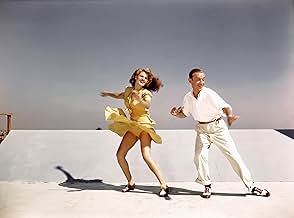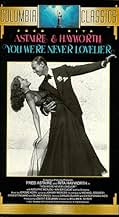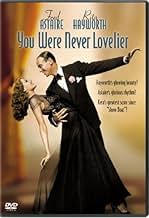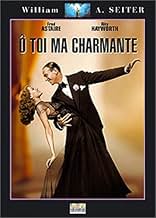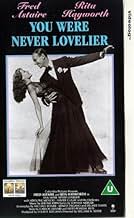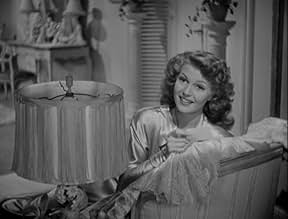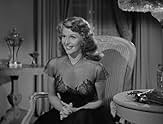IMDb रेटिंग
7.1/10
4.4 हज़ार
आपकी रेटिंग
अपनी भाषा में प्लॉट जोड़ेंIn Buenos Aires, a man who has decreed that his daughters must marry in order of age allows an American dancer to perform at his club under the condition that he play suitor to his second-ol... सभी पढ़ेंIn Buenos Aires, a man who has decreed that his daughters must marry in order of age allows an American dancer to perform at his club under the condition that he play suitor to his second-oldest daughter.In Buenos Aires, a man who has decreed that his daughters must marry in order of age allows an American dancer to perform at his club under the condition that he play suitor to his second-oldest daughter.
- 3 ऑस्कर के लिए नामांकित
- 3 कुल नामांकन
Kirk Alyn
- Julia's Groom
- (बिना क्रेडिट के)
Desi Arnaz
- Band Singer
- (बिना क्रेडिट के)
Larry Arnold
- Wedding Guest
- (बिना क्रेडिट के)
William A. Boardway
- Wedding Guest
- (बिना क्रेडिट के)
Stanley Brown
- Roddy - Cecy's Boyfriend
- (बिना क्रेडिट के)
George Bunny
- Flower Man
- (बिना क्रेडिट के)
James Carlisle
- Wedding Guest
- (बिना क्रेडिट के)
Jack Chefe
- Nightclub Patron
- (बिना क्रेडिट के)
फ़ीचर्ड समीक्षाएं
...and Fred Astaire was never as boyishly charming as he is here. This is a lovely, escapist, feel-good musical made in the early 40's to appease WW2-weary audiences. This is Rita and Fred's second (and final) outing after the surprise success of 'You'll Never Get Rich', and, while the first film was very enjoyable, this is an improvement on it's predecessor.
Hayworth shines as the girl who's not very interested in marriage until a 'secret admirer' and Fred Astaire come into the picture. She's very beautiful and glamorous in the role; the 'Cansino-to-Hayworth' transformation was going along nicely at the film's time of release. Astaire is always very appealing, and he does light comedy quite well. This hs a far sharper script than 'You'll Never Get Rich' and benefits from the non-wartime backdrop. Yes, the war was going on when Rita and Fred were making dancing magic, but you'd never know it from the happy little self-contained vacuum that Columbia creates for the pair in a story meant to be set in exotic South America.
I guess Rita, with her Latin roots, was the perfect choice for Maria, and she manages to outdo the master Astaire in the Latino-inspired dance routines. Her singing is dubbed, but Rita's dancing is sublime and her acting is very effective.
This film also has more memorable songs than the 1941 Astaire-Hayworth outing (I don't particularly like to compare, but it's hard not to), with 'You Were Never Lovelier', 'Shorty George' and 'I'm Old Fashioned' being great tunes. 'Shorty George' entranced me so much that I re-played the sequence on DVD three times before I moved forward in the film!
It doesn't have much of a plot, but we know that Astaire's musicals were always light on this factor so we can be forgiving. What it does have is a perfect, innocent sweetness that cannot possibly be recaptured today. From early scenes with Astaire trying to make conservation with a haughty Rita, to the final scene where the awkward yet lovable Fred arrives as Rita's 'knight in shining armor' on a white horse, 'You Were Never Lovelier' is just...well, lovely.
8/10.
Hayworth shines as the girl who's not very interested in marriage until a 'secret admirer' and Fred Astaire come into the picture. She's very beautiful and glamorous in the role; the 'Cansino-to-Hayworth' transformation was going along nicely at the film's time of release. Astaire is always very appealing, and he does light comedy quite well. This hs a far sharper script than 'You'll Never Get Rich' and benefits from the non-wartime backdrop. Yes, the war was going on when Rita and Fred were making dancing magic, but you'd never know it from the happy little self-contained vacuum that Columbia creates for the pair in a story meant to be set in exotic South America.
I guess Rita, with her Latin roots, was the perfect choice for Maria, and she manages to outdo the master Astaire in the Latino-inspired dance routines. Her singing is dubbed, but Rita's dancing is sublime and her acting is very effective.
This film also has more memorable songs than the 1941 Astaire-Hayworth outing (I don't particularly like to compare, but it's hard not to), with 'You Were Never Lovelier', 'Shorty George' and 'I'm Old Fashioned' being great tunes. 'Shorty George' entranced me so much that I re-played the sequence on DVD three times before I moved forward in the film!
It doesn't have much of a plot, but we know that Astaire's musicals were always light on this factor so we can be forgiving. What it does have is a perfect, innocent sweetness that cannot possibly be recaptured today. From early scenes with Astaire trying to make conservation with a haughty Rita, to the final scene where the awkward yet lovable Fred arrives as Rita's 'knight in shining armor' on a white horse, 'You Were Never Lovelier' is just...well, lovely.
8/10.
It would have been nice had this not been World War II and we could actually have done this film in Buenos Aires. As it is, except for a few newsreel shots at the beginning of the film, this might as well have taken place in San Diego.
Having said that this tinsel of a story is put over by the charm and beauty of its two leads, Fred Astaire and Rita Hayworth. Not to mention a good supporting cast led by Adolphe Menjou who is busy poaching on the preserve of Hollywood cranky fathers usually inhabited by folks like Eugene Palette and George Barbier.
Menjou's got some strange ideas. He wants to see his daughters get married, but in descending order. Rita is number two daughter and she's holding things up for three and four. Of course numbers three and four have fiancés panting at the bit.
Through the usual comedy of errors that are prevalent in Fred Astaire movies, Menjou's conceived a dislike for Fred and Rita's seeing something in him. How will it all work out?
Astaire movies always have flimsy or silly plot lines, but they have him and an attractive female partner dancing to some of the best music ever written for the screen. And when it's Jerome Kern's music, it don't get much better than that.
And the dancing partners don't get more talented than Rita Hayworth. She is positively radiant in this film. And she and Fred dance divinely to one of my favorite Jerome Kern ballads, I'm Old Fashioned.
Reason enough to see this film.
Having said that this tinsel of a story is put over by the charm and beauty of its two leads, Fred Astaire and Rita Hayworth. Not to mention a good supporting cast led by Adolphe Menjou who is busy poaching on the preserve of Hollywood cranky fathers usually inhabited by folks like Eugene Palette and George Barbier.
Menjou's got some strange ideas. He wants to see his daughters get married, but in descending order. Rita is number two daughter and she's holding things up for three and four. Of course numbers three and four have fiancés panting at the bit.
Through the usual comedy of errors that are prevalent in Fred Astaire movies, Menjou's conceived a dislike for Fred and Rita's seeing something in him. How will it all work out?
Astaire movies always have flimsy or silly plot lines, but they have him and an attractive female partner dancing to some of the best music ever written for the screen. And when it's Jerome Kern's music, it don't get much better than that.
And the dancing partners don't get more talented than Rita Hayworth. She is positively radiant in this film. And she and Fred dance divinely to one of my favorite Jerome Kern ballads, I'm Old Fashioned.
Reason enough to see this film.
Okay, it's not Tosca. But holy smoke, what an efflorescence of talented song writers and lyricists the American stage produced in the thirty years between 1925 and 1955! Irving Berlin, George and Ira Gershwin, Yip Harburg, Johnny Mercer, Jerome Kern, Cole Porter, the list goes on. And the songs! From Astaire's films alone, we have Orchids in the Moonlight, The Carioca, Let's Face the Music and Dance, Yesterdays, Smoke Gets in Your Eyes, Cheek to Cheek, The Way You Look Tonight, A Fine Romance, They All Laughed, Let's Call the Whole Thing off ("You say tomato, I say tomahto..."), They Can't Take That Away From Me. That's a handful of the more familiar numbers from the first films Astaire made with Ginger Rogers.
"You Were Never Lovelier" has melodies by Jerome Kern and lyrics by Johnny Mercer. Ginger isn't here, but Rita Hayworth is. Her beauty is undeniable. She'd undergone hair removal and Hollywood glamorization by this time and in a few years a pin-up pic of her was to be pasted onto a famous bomb. I missed Astaire's earlier movies. By the time I was old enough, Gene Kelly dominated the screen. I saw Astaire in his later films and didn't like him nearly as much as Kelly. Kelly's background was in athletics. He was masculine and muscular and working class. Astaire's background was in ballroom dancing. How can an adolescent identify with a skinny balding narrow-shouldered dancer in a tuxedo who doesn't swing from ropes? But there's no longer much doubt in most peoples' minds, including mine, that Astaire was by far the better dancer, Kelly's charm notwithstanding. Astaire was elegant and precise and his dance steps were varied; Kelly seemed to repeat his leg-over-leg jumps over and over in each number.
At any rate, the plot of "You Were Never Lovelier" is rather original for an Astaire musical. I don't think it goes farther back in history than Aristophanes. It's a complicated business involving mistaken identities, an interfering father, and whatnot. But it doesn't matter, because the numbers are what counts. Kern and Mercer provide two songs that have become standards: "Dearly Beloved" and "I'm Old Fashioned." Anyone who wants to see the Hollywood musical at its best would be advised to listen to either song and to watch the dancing during "I'm Old Fashioned." "Dearly Beloved" occurs throughout the film as a kind of theme, and is sung once by Astaire and once by Hayworth, but is never accompanied by a dance. There are other songs too, of course, although none enchants the way these two ballads do. One of the numbers is "The Shorty George." Astaire's movies often had references to a new popular dance craze -- The Carioca, The Yam, the Sluefoot -- and this is an instance of that tendency. It was named after a real dancer, George Snowden, a dancer at the Savoy Ballroom in Harlem, known as "Shorty." If "I'm Old Fashioned" has a swooping grace, "The Shorty George" includes sections set at a blistering tempo and demonstrates Rita Hayworth's energy and range as a dancer.
Speaking of energy, how do they do it? "I'm Old Fashioned", like most of Astaire's numbers, consists of very long takes in medium distance that depend on both precision and physical stamina. (If you want to see an example of the opposite, watch Travolta do his final number in "Staying Alive.") I counted three cuts during the entire dance, which lasts four minutes and thirty-seven seconds. I'd have a heart attack after the first thirty-seven seconds.
Well, okay. It's not Fred and Ginger. It's not even Tosca. But if you want to watch two people engaged in the unpretentious exercise of a physical skill acquired only with the utmost difficulty, this one shouldn't be missed.
"You Were Never Lovelier" has melodies by Jerome Kern and lyrics by Johnny Mercer. Ginger isn't here, but Rita Hayworth is. Her beauty is undeniable. She'd undergone hair removal and Hollywood glamorization by this time and in a few years a pin-up pic of her was to be pasted onto a famous bomb. I missed Astaire's earlier movies. By the time I was old enough, Gene Kelly dominated the screen. I saw Astaire in his later films and didn't like him nearly as much as Kelly. Kelly's background was in athletics. He was masculine and muscular and working class. Astaire's background was in ballroom dancing. How can an adolescent identify with a skinny balding narrow-shouldered dancer in a tuxedo who doesn't swing from ropes? But there's no longer much doubt in most peoples' minds, including mine, that Astaire was by far the better dancer, Kelly's charm notwithstanding. Astaire was elegant and precise and his dance steps were varied; Kelly seemed to repeat his leg-over-leg jumps over and over in each number.
At any rate, the plot of "You Were Never Lovelier" is rather original for an Astaire musical. I don't think it goes farther back in history than Aristophanes. It's a complicated business involving mistaken identities, an interfering father, and whatnot. But it doesn't matter, because the numbers are what counts. Kern and Mercer provide two songs that have become standards: "Dearly Beloved" and "I'm Old Fashioned." Anyone who wants to see the Hollywood musical at its best would be advised to listen to either song and to watch the dancing during "I'm Old Fashioned." "Dearly Beloved" occurs throughout the film as a kind of theme, and is sung once by Astaire and once by Hayworth, but is never accompanied by a dance. There are other songs too, of course, although none enchants the way these two ballads do. One of the numbers is "The Shorty George." Astaire's movies often had references to a new popular dance craze -- The Carioca, The Yam, the Sluefoot -- and this is an instance of that tendency. It was named after a real dancer, George Snowden, a dancer at the Savoy Ballroom in Harlem, known as "Shorty." If "I'm Old Fashioned" has a swooping grace, "The Shorty George" includes sections set at a blistering tempo and demonstrates Rita Hayworth's energy and range as a dancer.
Speaking of energy, how do they do it? "I'm Old Fashioned", like most of Astaire's numbers, consists of very long takes in medium distance that depend on both precision and physical stamina. (If you want to see an example of the opposite, watch Travolta do his final number in "Staying Alive.") I counted three cuts during the entire dance, which lasts four minutes and thirty-seven seconds. I'd have a heart attack after the first thirty-seven seconds.
Well, okay. It's not Fred and Ginger. It's not even Tosca. But if you want to watch two people engaged in the unpretentious exercise of a physical skill acquired only with the utmost difficulty, this one shouldn't be missed.
Jerome Kern lovely music is what gives this film LIFE! And the fact that Rita Hayworth and Fred Astaire are fantastic in this film.
Fred Astaire was one of the best dancers in motion picture history. But, not a lot of people know that, Rita Hayworth was a very talented dancer too. And believe me, she puts her skills to work in this film.
Now...I'm not going to lie, it's not the best storyline and the acting isn't the best. Although (Adolphe Menjou) really keeps the film going with his short temper and wit.
Robert Davis (Fred Astaire) is a well known dancer who tries to get a contract at Eduardo Acuna (Adolphe Menjou) night club, but he's not having any luck at all.
Through some very insane events Robert and Maria Acuna (Rita Hayworth) begin to have feeling for one another. But her father Eduardo Acuna doesn't want his daughter messing around with a dancer.
But with a number of wonderful tunes and some great moves 'Love' wins-out in the end.
It's a fun little film that all of you will enjoy...You Were Never Lovelier.
Fred Astaire was one of the best dancers in motion picture history. But, not a lot of people know that, Rita Hayworth was a very talented dancer too. And believe me, she puts her skills to work in this film.
Now...I'm not going to lie, it's not the best storyline and the acting isn't the best. Although (Adolphe Menjou) really keeps the film going with his short temper and wit.
Robert Davis (Fred Astaire) is a well known dancer who tries to get a contract at Eduardo Acuna (Adolphe Menjou) night club, but he's not having any luck at all.
Through some very insane events Robert and Maria Acuna (Rita Hayworth) begin to have feeling for one another. But her father Eduardo Acuna doesn't want his daughter messing around with a dancer.
But with a number of wonderful tunes and some great moves 'Love' wins-out in the end.
It's a fun little film that all of you will enjoy...You Were Never Lovelier.
Set in Hollywood's fanciful concept of Buenos Aires during the early 1940's, "You Were Never Lovelier" is pure escapist fluff that has been filmed with class. Of course, Fred Astaire adds class to any film in which he appears, and the ravishing Rita Hayworth is eye candy with talent. Astaire always refused to say who was his favorite dancing partner, but, based on the rapport and coordination between the two, Hayworth must have been high on his list. She is a beautiful trained dancer, and the sight of Rita tossing her long red mane while gracefully keeping step with Astaire makes one wish that Astaire-Hayworth musicals had been as numerous as those with Astaire-Rogers.
The film's flimsy plot revolves around a wealthy Argentine patriarch's refusal to let his daughters marry out of age order, and Hayworth's disinterest in marriage is delaying the weddings of her two younger sisters. Adolphe Menjou, who plays the father of four daughters, dreams up a mystery suitor, and eventually Rita confuses Astaire with this imaginary beau. But, never mind the lack of Latin flavor or the transparent silliness of the script. The plot has no surprises, but enough Jerome Kern songs and elegant dance routines, either solo by Astaire or Astaire and Hayworth together, punctuate the proceedings to keep viewers entertained.
Of course, audiences have to suspend disbelief and accept that a love goddess like Rita would fall for a skinny, somewhat older, and ordinary looking Fred, when dozens of tall, dark, and handsome Latin men were panting for her attention. But, like the sound-stage Argentine sets, this is fantasy, and Fred always wins the gorgeous girl, be she Ginger Rogers, Audrey Hepburn, or Judy Garland. Of his dancing partners, only Gene Kelly got away. Women must be won over by Fred's moves, and what great moves they are. "You Were Never Lovelier" boasts some excellent dance routines, and Astaire's work with Hayworth ranks with his best. If the nonsensical plot fails to engage you, hold on, because the dancing will carry you away.
The film's flimsy plot revolves around a wealthy Argentine patriarch's refusal to let his daughters marry out of age order, and Hayworth's disinterest in marriage is delaying the weddings of her two younger sisters. Adolphe Menjou, who plays the father of four daughters, dreams up a mystery suitor, and eventually Rita confuses Astaire with this imaginary beau. But, never mind the lack of Latin flavor or the transparent silliness of the script. The plot has no surprises, but enough Jerome Kern songs and elegant dance routines, either solo by Astaire or Astaire and Hayworth together, punctuate the proceedings to keep viewers entertained.
Of course, audiences have to suspend disbelief and accept that a love goddess like Rita would fall for a skinny, somewhat older, and ordinary looking Fred, when dozens of tall, dark, and handsome Latin men were panting for her attention. But, like the sound-stage Argentine sets, this is fantasy, and Fred always wins the gorgeous girl, be she Ginger Rogers, Audrey Hepburn, or Judy Garland. Of his dancing partners, only Gene Kelly got away. Women must be won over by Fred's moves, and what great moves they are. "You Were Never Lovelier" boasts some excellent dance routines, and Astaire's work with Hayworth ranks with his best. If the nonsensical plot fails to engage you, hold on, because the dancing will carry you away.
क्या आपको पता है
- ट्रिवियाBecause all the sets on the Columbia lot were occupied, Fred Astaire and Rita Hayworth rehearsed most of their routines in the nearby Hollywood Cemetery funeral parlor. They had to stop rehearsing to the upbeat music whenever a funeral procession arrived.
- गूफ़When Maria and Mrs. Castro meet Robert in the sky room, Maria holds her overcoat lapels with both hands. Between shots she appears with both her arms hanging.
- भाव
Mrs. Delfina Acuña: I wish you wouldn't speak while I'm interrupting.
- क्रेज़ी क्रेडिटIn the opening credits, the two film stars and the movie title appear on the front and back of a flower gift card held in the hands of a glamorous woman. The rest of the credits follow as in normal film credits.
- कनेक्शनFeatured in Rocket Gibraltar (1988)
- साउंडट्रैकYou Were Never Lovelier
(1942) (uncredited)
Music by Jerome Kern
Lyrics by Johnny Mercer
Played during the opening credits and often as background music
Played by Xavier Cugat and His Orchestra and sung by Fred Astaire
Danced by Fred Astaire and Rita Hayworth at the anniversary party
Danced by Fred Astaire and Rita Hayworth at the end and sung by an offscreen chorus
टॉप पसंद
रेटिंग देने के लिए साइन-इन करें और वैयक्तिकृत सुझावों के लिए वॉचलिस्ट करें
- How long is You Were Never Lovelier?Alexa द्वारा संचालित
विवरण
बॉक्स ऑफ़िस
- US और कनाडा में सकल
- $6,72,900
- चलने की अवधि
- 1 घं 37 मि(97 min)
- रंग
- पक्ष अनुपात
- 1.37 : 1
इस पेज में योगदान दें
किसी बदलाव का सुझाव दें या अनुपलब्ध कॉन्टेंट जोड़ें


